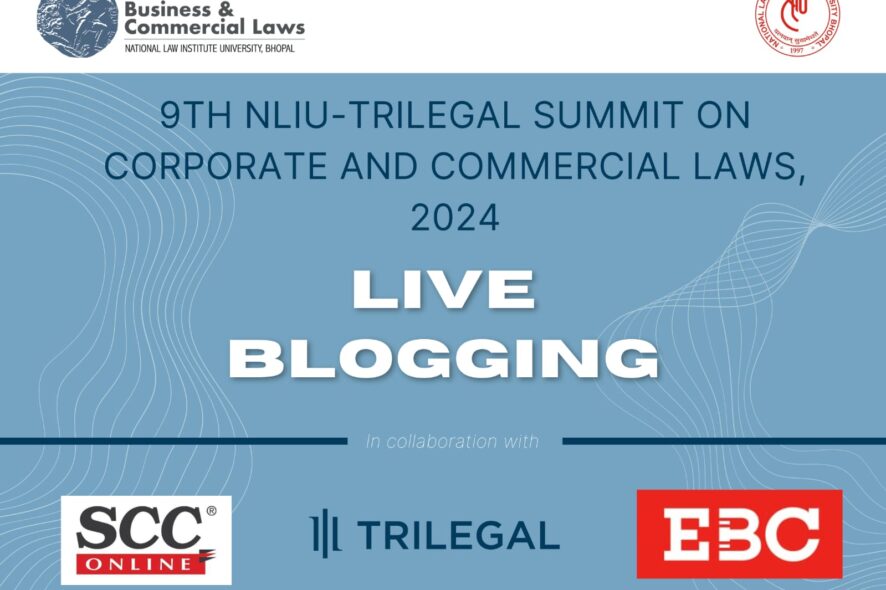Since its inception, the National Law Institute University’s Centre for Business and Commercial Laws(CBCL), has been recognised as a “Centre of Excellence”. Constituted in 2008, the centre aims to generate awareness and facilitate research in Indian business and commercial laws. The flagship event of CBCL, The NLIU-Trilegal Summit, has emerged as a premier corporate law event in the law school circuit over the past 8 years. The 9th edition, being hosted this year, received numerous entries from law students across the country, of which the top 15 manuscripts have been selected for presentation. These papers will be presented before some of the well-known luminaries in the field of commercial laws, such as Mr. Mohit Rohatgi (Partner, Trilegal), Mr. Albin George Thomas (Partner, Trilegal) and Mr Ramakant Rai (Partner, Trilegal) have come down to the campus of NLIU and would be a part of the summit as “panellists”
12:30 pm, 9th February 2024- Registration
The registrations for the NLIU- Trilegal Summit have begun! The participants are gathering in the University Auditorium for the event. The Summit has seen a surge in submissions this year with over 170 papers being sent from more than 40 Law Schools spanning the country. The selected papers reflect a diverse range of participants, with many submissions coming from collaborations between different colleges. The qualifying universities include:
- National Law School of India, Bangalore
- National Academy of Legal Studies and Research, Hyderabad
- National Law Institute University, Bhopal
- National Law University, Jodhpur
- Hidayatullah National Law University, Chattisgarh
- Rajiv Gandhi National University of Law, Patiala
- Dr. Ram Manohar Lohiya National Law University, Lucknow
- National University of Study and Research in Law, Ranchi
- National Law University, Odisha
- Maharashtra National Law University, Mumbai
- Damodaram Sanjivayya National Law University, Visakhapatnam
- Institute Of Law, Nirma University
- Indian Institute of Management, Rohtak
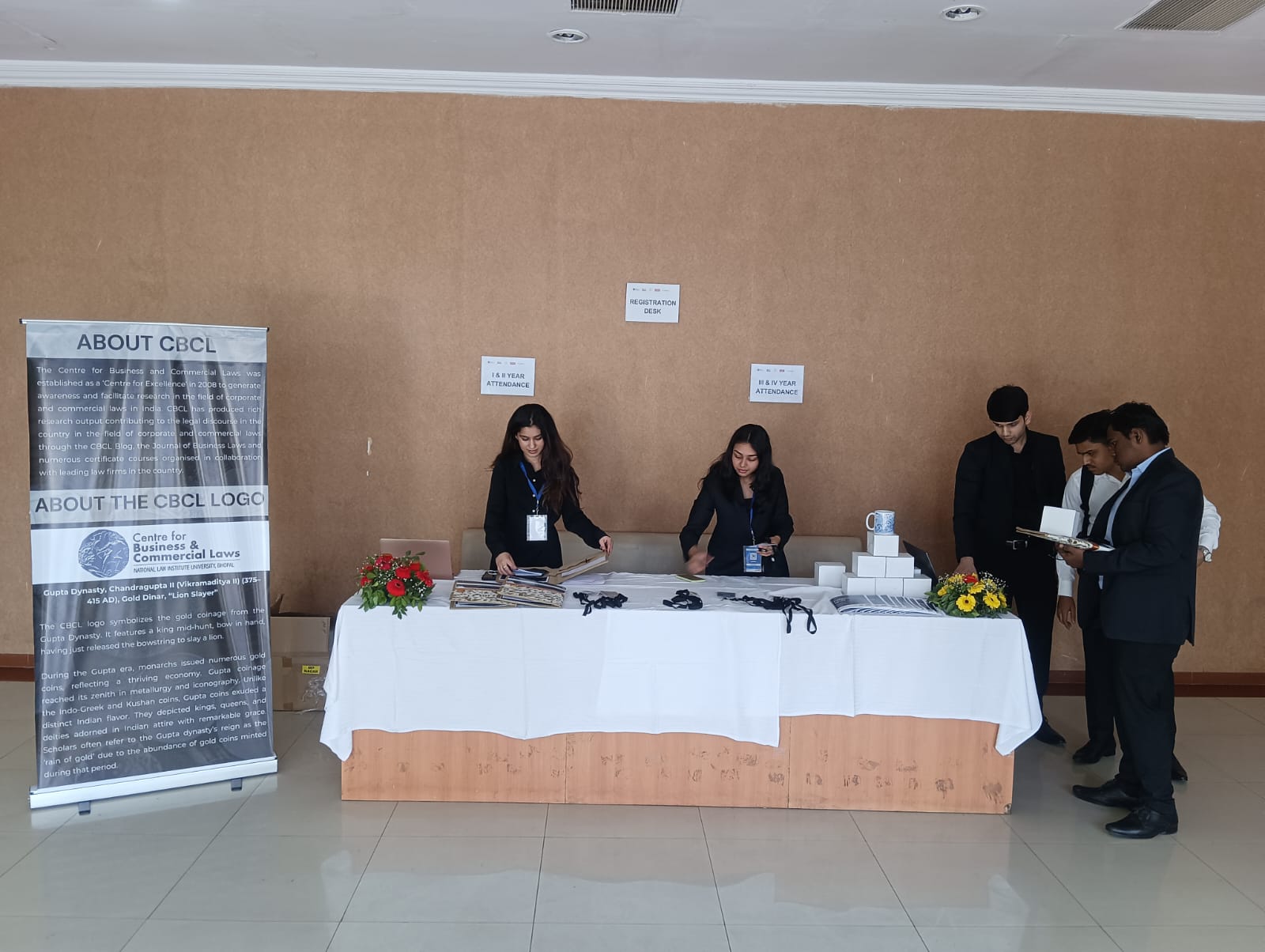
3:00 pm, 9th February 2024- Inaugural Ceremony
The inaugural ceremony of the 9th Trilegal Summit is in motion! Mr. Vachas Chaturvedi (Co-convenor, CBCL) extended warm greetings to our esteemed guests, participants, the honourable Vice-Chancellor, and attendees. The ceremonial lighting of the lamp, led by our esteemed guests and the Vice-Chancellor Dr. (Prof.) S. Surya Prakash was followed by his heartfelt address to the audience. He emphasized the significance of intellectual discourse and presentations at this summit, urging participants to advance in the realms of commercial and competition law. He concluded by congratulating all on the event’s success.
Mr. Ramakant Rai (Partner, Trilegal) commended the participants for their scholarly contributions, acknowledging the fruitful partnership between NLIU, Bhopal, and CBCL over nine years. He expressed gratitude to Dr. Ghayur Alam (Chairperson, CBCL) for their pivotal role in the summit’s success and encouraged attendees to engage in the forthcoming panel discussion on Artificial Intelligence and the Legal Profession.
Hon’ble Justice Anjuli Palo (Chief Guest), highlighted the summit’s role in illuminating lesser-known areas of corporate and commercial law, particularly among students primarily focused on judicial services. She expressed anticipation for discussions on developing legal fields such as Data Privacy, Artificial Intelligence and Intellectual Property Laws, extending her best wishes to all participants.
Ms. Samavi Srivastava (CBCL, Convenor) officially inaugurated the summit, extending her best wishes for a fruitful engagement!

4:00 pm, 9th February 2024-Interactive session
Ms. Samavi Srivastava ( Convenor, CBCL) started the session – ‘AI and the legal profession’ by introducing the panelists – Ms. Urvashi Pathak (Senior VP, Max Life) Mr. Mohit Rohatgi (Partner, Trilegal) Mr. Rahul Mathur (Partner, Trilegal) , Mr. Ramakant Rai ( Partner, Trilegal) and Mr. Albin George Thomas (Partner, Trilegal) and then opening the floor for audience questions. The panellists acknowledged all questions and answered them, giving all participants and attendees new insights on the topic. All the panelists, agreed and emphasised upon the fact that AI is going to part of the future, and it will evolve further. Mr. Rohatgi warned about the complacency that might come with AI, addressing the fact one is to make AI their servant not let it become your master. Ms. Urvashi Pathak talked about how AI might not completely replace jobs but it is a definite necessity to keep up with it as those who do will do much better.
Further Mr. Ramakant Rai emphasised on the fact that it is a possibility that AI will take over the world, but it is important to note that the world is run by humans and there is some comfort in that. Mr Albin George Thomas emphasised that lawyers must embrace technology and AI tools to streamline tasks like paperwork and data preparation, freeing up time for more ‘worthwhile’ tasks. On the topic of breach of confidence via the usage of third party AI softwares, Mr. Albin George Thomas revealed that Trilegal has been developing an AI software of their own.
The questions ranged from AI being on the board of directors, AI as a separate legal entity, Generative AI such as Chatgpt being used by the bench to publish judgements and a shift in our perspective of AI as merely a tool. It was an intellectual dialogue between the panelists and the participants, keeping everyone engaged and throwing light on the substance of AI and it’s functioning in the current legal system.
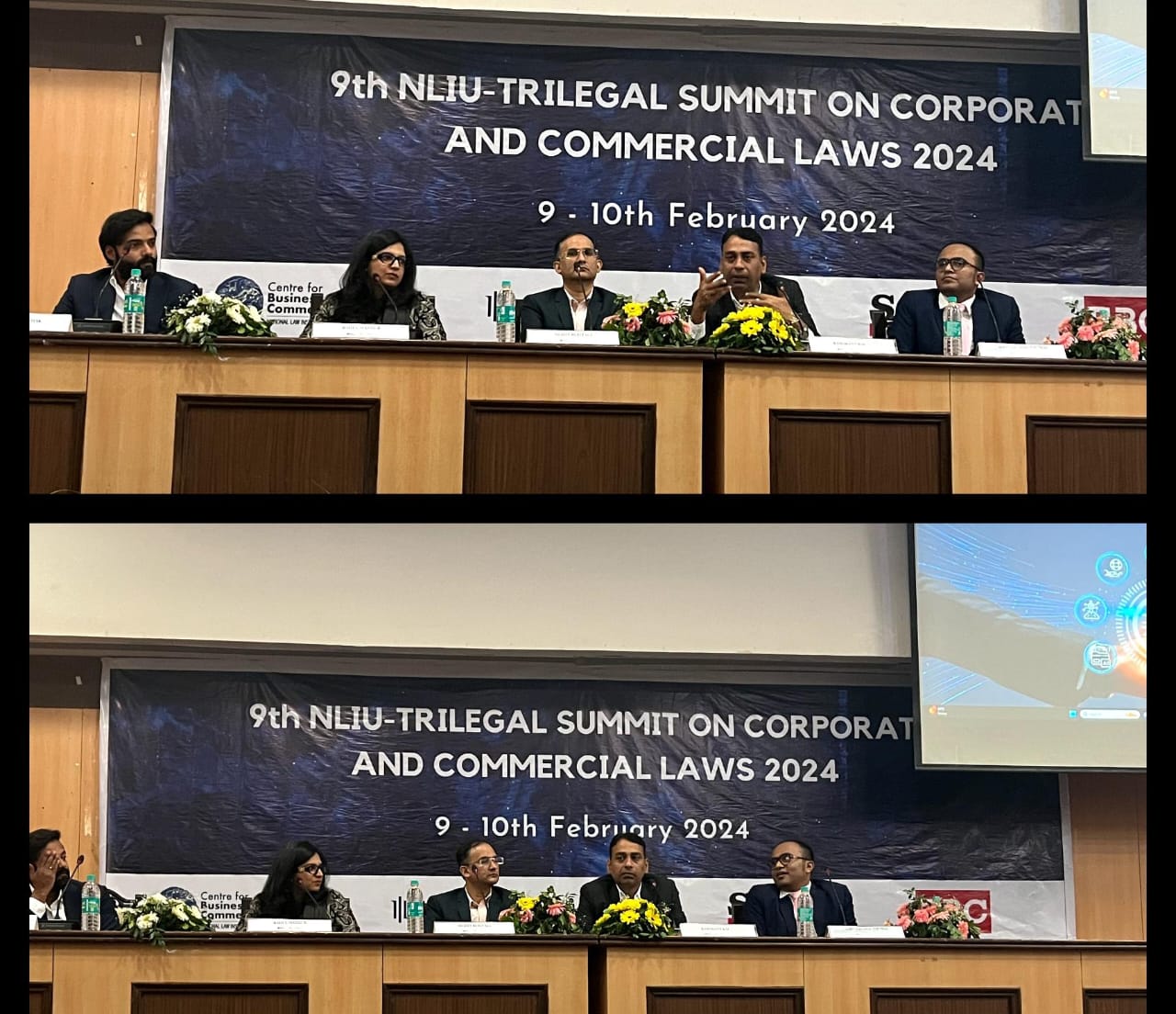
5: 30 pm, 9th February 2024- Session A: Paper presentations
The paper presentations would be divided into three sessions. In the first session, 5 papers would be presented in front of the panel consisting of Ms. Urvashi Pathak (Senior VP, Max Life) Mr. Mohit Rohtagi (Partner, Trilegal) Mr. Rahul Mathur (Partner, Trilegal) , Mr. Ramakant Rai ( Partner, Trilegal), Mr. Albin George Thomas (Partner, Trilegal) and Mr. Siddharth Raja (Senior Partner, VERTICES)
Paper 1 – “Trade Reform: A Comprehensive Look at the Settlement Period and the T+0 implementation in India” by Sahil Sachin Salve and Sanjeev Rajepandhare
The presenters analysed India’s stock market settlement process, SEBI’s T+0 proposal, and its implications for stakeholders like FPIs and mutual funds. The presenter highlights SEBI’s T+0 proposition benefits like enhanced capital utilization but also challenges for market players. The presenters were questioned on the technicalities and the intricacies of T+0. The presenter underscored the importance of a phased approach and collaboration among market players, regulators, and the broader financial ecosystem for successful implementation and adaptation to these advancements.
Paper 2 : “Greening the Insolvency Regime: Sustainability as the Ideological and Substantive Backbone of the IBC 2016″ by Aditya H and Ishwaryah Manikandan
The presenters broke down their methods of analysis. Emphasizing on the relevance of climate change in the world of corporate law. The presenters further proposed several solutions to tackle the issues. The panel asked to the presenters to emphasise upon the fact that if all the solutions provided by them were put into place, the essence of the insolvency would get lost as it is ultimately a commercial transaction. The presenters were adept at answering all of the questions asked.
Paper 3: Corporate Raiders or Do-Gooders? : Analysis of Activist Investors In An Indian Context Sub-theme: Company Law by Manasvi Kanaparthy and Ayushman Biswal
The presenters analysed current public policies fail to address climate change adequately, proposing private law interventions to foster eco-friendly corporate behaviour. The presenter explored how the Insolvency and Bankruptcy Code (IBC) can integrate climate mitigation measures. Advocating for leveraging the IBC through a game-theoretical approach, the presentation suggested three strategies: excluding polluters from IBC benefits, incorporating ESG standards in corporate evaluation, and strengthening environmental liabilities. Questions were asked by the panelists and the audience about maintaining insolvency’s essence amidst these changes and the role of environmental trustees on the Committee of Creditors (CoC) in light of their role in the CIRP process
Paper 4: “Harominizing Expediency and Commericial Wisdom: Proposing AI integration in the Insolvency and Bankruptcy Code to Enhance Efficiency and Preserve the Mandate of Expediency in the IBC Ecosystem” by Sarthak Kumar and Aditya Singh
The presenters emphasized activist investors’ potential impact on Indian corporate governance, citing regulatory trends from the Companies Act and SEBI’s Stewardship Code. The Adani Group case study underscores framework limitations. The presenters suggested that activist investors, akin to Wall Street counterparts, could enhance performance and ESG practices, alleviating regulatory burdens. Recognizing and incentivizing these actors could improve oversight mechanisms. Questions were asked by the panelists and the audience regarding the necessity of intervention when guidelines aren’t violated, concerns about activist shareholders’ autonomy, and distinctions between the meaning of activist investors and shareholder activism.
Paper 5: “Dark Patterns and Antitrust : Can India afford the Cost of Privacy?” by Mayank Bhandari and Tejaswini Kaushal
The presenter analysed the impact of dark patterns on children’s privacy in the digital era, particularly focusing on the intersection between Big Data’s anticompetitive practices, data protection, and competition laws in India. The presentation focused on how manipulative dark patterns extract excessive data from vulnerable children, despite India’s ban on targeted advertising and behavioral monitoring for minors. With India’s ban on targeted ads for children, it raises a critical question: Can India prioritize children’s privacy over tech giants’ economic interests? Balancing economic considerations with ethical imperatives, the presenter underscored the importance of addressing the long-term costs of inaction in safeguarding children’s privacy. Questions were asked by the panelists and audience about the drawbacks of targeted ads despite offering tailored content and the relevance of ads for children who can’t make online purchases.
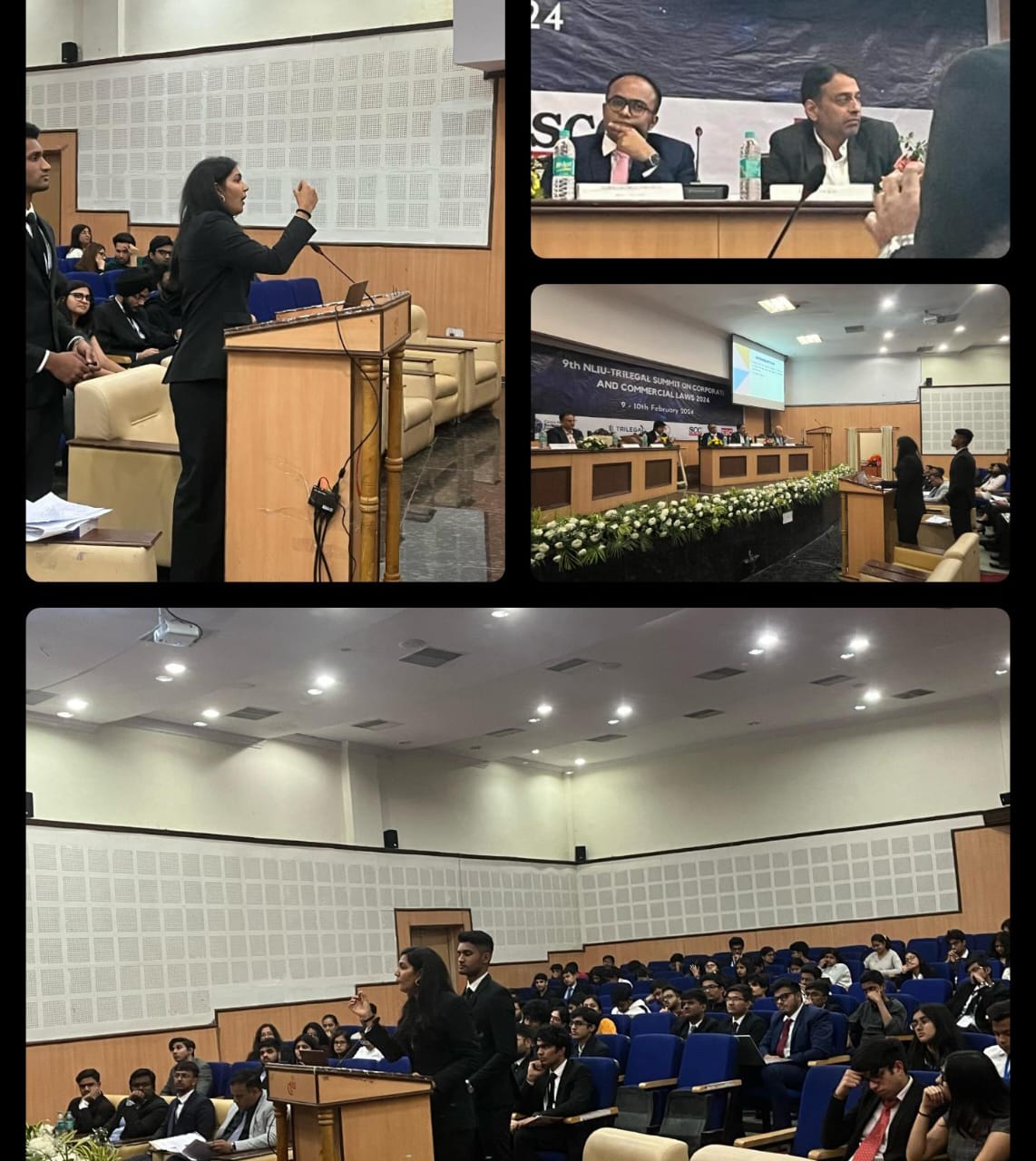
Day 1 of the summit came to an end, and the panelists and participants proceeded for dinner.
10:00 am, 10th February 2024- EBC Guest Lecture by Mr. Siddharth Raja
Day 2 of the summit began with Mr. Siddharth Raja with his lecture about ‘Appreciating Modern Company Law’, giving attendees insightful knowledge about corporate and company law and the fine line between their differences.
Mr. Siddharth Raja likened the EBC bare acts to the Bible for the students as they serve as indispensable resources for studying company law. The aim of the session was to deconstruct the enormity of company law by helping to provide junior practitioners a general outline of body of skills application in near world situations.
Emphasizing the importance of referencing tools like SEBI and the Companies Act, Mr. Raja underscored the need for students to preserve copies of old acts.
He highlighted that incorporating the five cardinal rules of studying company law ensures a thorough understanding of the subject matter. These rules emphasize scrutinizing main provisions, assessing applicability across different company types, considering specific delegated legislation, embodying statutes effectively, and examining substantive aspects beyond mere procedures.
Mr. Raja advocated for a revamped curriculum that incorporates three most relevant statutes such as contract, corporate, and foreign exchange laws, ensuring students keep pace with evolving regulatory landscapes.
In the current curriculum of law schools, subjects are taught in silos. An integrated curriculum would enable students to grasp interconnected concepts, such as those relating to foreign exchange management and securities laws.
He provided a brief historical background of company law, delving into its evolution over time. One notable milestone discussed was the Baba Committee report of 1952, which advocated for reforms in the Companies Act, aiming to make it more aligned with laissez-faire principles and the tenets of a free market economy.
Mr. Raja then proceeded to give a detailed schematic outline of the Companies Act, 2013. In the latter part of the presentation, he also focused on the role of the company’s board of directors and the Henry VIII Clause.
He emphasized the importance of retaining insolvency provisions within the Companies Act, even with the existence of a separate insolvency code. He highlighted that the essential guide for all company law students, “Principles of Modern Company Law” by Gower, addresses this complexity by acknowledging that it’s not entirely feasible to isolate all nuances of insolvency.
Questions were asked after the lecture about the Irani committee recommendations and how Section 43A mandated companies to register themselves as a public company and the ‘deemed’ provision.
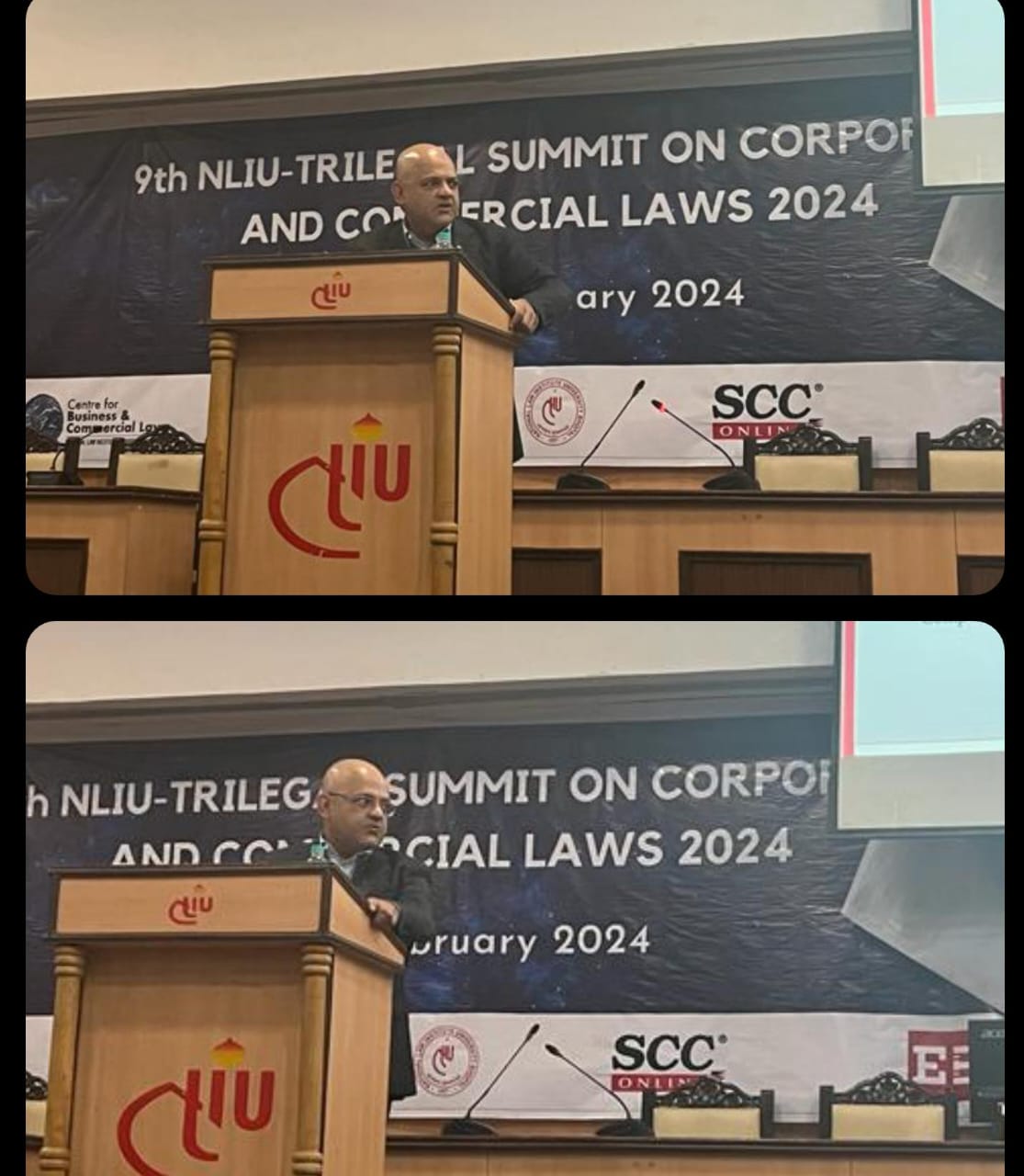
11:30 am, 10th February 2024- Session B- Presentations
Presenters and the panelists gathered again in the auditorium for the second session of presentations. In this session, 5 more papers would be presented in front of a panel consisting of Ms. Urvashi Pathak (Senior VP, Max Life) Mr. Mohit Rohatgi (Partner, Trilegal) Mr. Rahul Mathur (Partner, Trilegal) , Mr. Ramakant Rai ( Partner, Trilegal), Mr. Albin George Thomas (Partner, Trilegal) and Mr. Bishwajit Dubey (Independent practioner)
Paper 6 – “Navigating the turbulent waters : Unravelling the Controversial Role of Taxation Authorities within the Insolvency and Bankruptcy Code’s Waterfall Mechanism” by Oshin Beniwal and Devesh Pratap Mall
The presenters emphasized the fact that Section 53 of the Insolvency and Bankruptcy Code (IBC) delineates the hierarchy for distributing proceeds from asset liquidation among stakeholders. They analyzed the emerging dilemma concerning the status of Taxation Authorities in this order of priority. Recent court decisions diverge from established norms, causing confusion among creditors and undermining the IBC’s intended goals. There was a discussion on the relevance of the rainbow papers to the issue. The presenters proposed legislative changes to clarify creditor hierarchy, considering functional and jurisdictional factors.
Paper 7: “Opening the Doors of Private Enforcement : Analysing False Advertisement Claims from an Antitrust Lens” by Sunidhi Kashyap
The presenter explored the ramifications of false advertising on fair competition. She started by higlighting the difference between competitive and anti-competitive. The presenter analyzed how deceptive marketing practices can create a market of inferior products, known as “lemons,” thus harming honest competitors. The presenter challenges the notion that false advertising causes minimal harm and emphasizes the importance of protecting truthful competitors. The presenter relied on examples to address this issue, the presenter recommended expanding private enforcement through a case-by-case approach, ensuring that individual competitors have recourse against false advertising practices.
Paper 8: “Absorbing Sustainability into Antitrust Law” by Archita Satish and Ishika Garg
The presenters explored integrating sustainability into antitrust law in India, noting a gap in how agencies regulate private agreements for sustainability. It advocates for a broader threshold beyond consumer welfare, involving citizens as stakeholders due to the communal nature of the environment. The presenters suggested how Indian competition law can adopt sustainability goals. Questions were asked by the panellists and audience regarding the need for separate environmental laws, Competition Commission’s stance on sustainability agreements, jurisdiction of the tribunals, and merger efficiency within the economic framework of competition law.
Paper 9: “The IBC’s Real Estate Conundrum: Why it’s not the Right Fit for Homebuyers’ Woes” by Rohan Srivastava
The presenter evaluated how India accommodates the Real Estate sector and homebuyers within the Insolvency and Bankruptcy Code (IBC), analyzing jurisprudence and perspectives of both parties. He pointed the conflicts arising from sector-specific adjustments in the IBC. Advocating for sector-specific remedies like RERA. He suggested prioritizing homebuyers’ liquidation rights over substantive redressal within the IBC. Questions by the panellists and the audience included concerns about Escrow account cases and IBC’s efficacy for homebuyers, highlighting reliance on pre-RERA cases.
Paper 10: “Bridging the Murky Chasm: A Proferred Legal Blueprint to Resolve the Copyright Quandary and Data Privacy Dilemma in Generative AI Training” by Krati Gupta and Raj Shekhar
The presenters examined copyright infringement and data privacy concerns arising from Generative AI training, potentially impeding sector growth. They explored legal interpretations under the Copyright Act and Digital Personal Data Protection Act, suggesting amendments to accommodate GenAI training while safeguarding privacy. Questions were raised by the panelists and audience regarding legislative gaps in handling Generative AI, risks of processing confidential and copyrighted data, and regulatory oversight of public data usage under Section 43A.
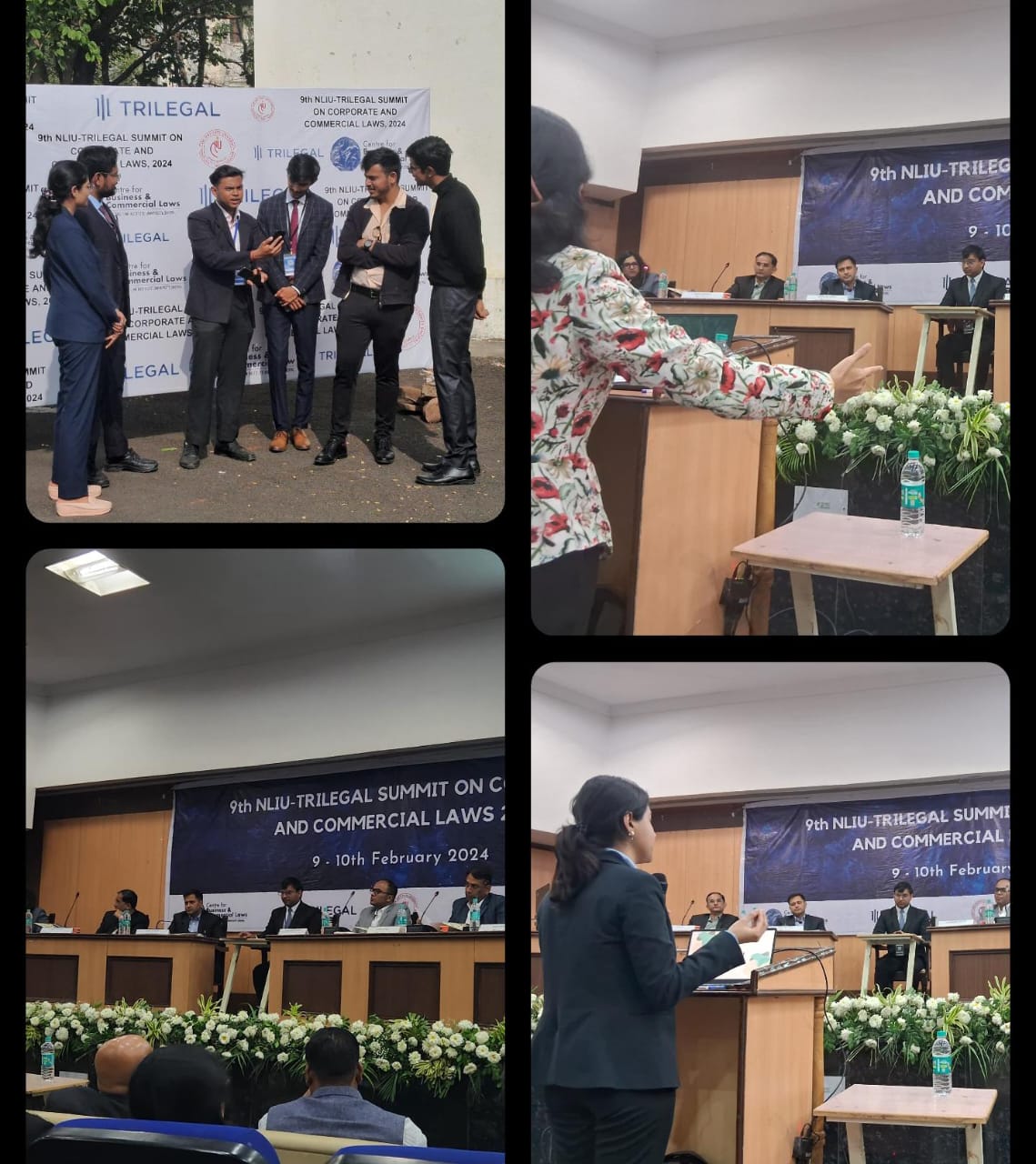
With this Session B came to an end and the panelists and participants proceeded for lunch.
2:30 pm, 10th February 2024- Session C- Presentations
In the final session of the summit, 5 more papers would be presented in front of a panel consisting of Mr. Amit Pratap Singh (Assistant Professor, NLIU, Bhopal) Mr. Mohit Rohatgi (Partner, Trilegal) Mr. Siddharth Raja (Partner, Vertices Partners) , Hon’ble Justice Anjuli Palo (Chief Guest), Mr. Albin George Thomas (Partner, Trilegal) and Mr. Bishwajit Dubey (Independent practioner).
Paper 11: “Sailing the Ship of Liabilities: Redefining Limited Liabilities for NBFCs in India” by Deepanshu and Digvijay Singh Maavi
The presenters focused on redefining the liability framework for Non-Banking Financial Companies (NBFCs) in India. Through analysis, the presenters explored issues stemming from unlimited liability and traced the evolution from British India to limited liability adoption. They noted varying preferences between individual and group liability. The presenters proposed a re-evaluation of limited liability’s trajectory across three phases: Establishment, Evaluation, and Implementation.
Paper 12: “Guilty until Proven Innocent? : Analysing SEBI’s Prohibition of Unexplained auspicious Trading Activities” by Vinita Singh and Jeeri Sanjana Reddy.
The presenters discussed SEBI’s proposed regulations on suspicious trading activities in the securities market. They examined challenges and compared presumptions of guilt under foreign securities laws. They cautioned that the current draft’s presumption of guilt may inconvenience investors and suggested that SEBI leverage modern technology in investigations. They recommended amending the regulations to raise the threshold for presumption, reducing subjectivity and vagueness to ensure fairness and clarity in enforcement.
Paper 13: “Sugarcane Farmers in Limbo: Analysing their position as Bajaj Hindusthan Sugar’s Operational Creditors” by Ashita Mathur
The presenter examined default claims by sugarcane farmers against Bajaj Hindusthan Sugar Ltd., totaling around 2860 crores, and their status as operational creditors (OCs) of the company. Research on past cases where farmers sought relief under the Code due to mill payment defaults is reviewed. The presenter critically analysed the feasibility of farmers’ suggestions. Conclusions emphasize the need to prioritize farmers’ interests, suggesting they be designated as ‘Priority Creditors’ in the Code to protect industry health during resolution or liquidation plans.
Paper 14: “Taxing Times: Assessing the Burden of Recent Tax Amendments on Online Skill Gaming” by Kaustubh R. Kulkarni and Aniket Rout.
The presenters discussed recent tax amendments on online money gaming enacted by the government in October 2023. They analysed legal judgments establishing a distinct category for online skill gaming and assessed the commercial feasibility of the tax changes. They found that the amendment lacks constitutionality and viability, particularly taxing the total money pool at a 28% rate. Drawing on tax regimes in France and the UK, the presenters argued for rollback of the amendment and propose policy adjustments to address the issue.
Paper 15: “Sailing through SEBI’s Symphony of the LODR (Second Amendment Regulations) 2023: How to combat the Hidden Agreements Shaping India’s Boardroom Overture?” by Kim Korwani and Sejal Gupta
The presenters discussed recent changes in Indian corporate governance, focusing on the SEBI (Listing Obligations and Disclosure Requirements) (Second Amendment) Regulations, 2023. Notable amendments include Clause 5A that emphasize the disclosure of agreements affecting listed entities’ management. The presenters further analyzed additional amendments like Clause 30A for prompt disclosure and Regulation 17(1D) mandating five-year director consent. Case studies highlighted transparency’s importance, such as the NDTV-Adani Hostile Takeover and Amazon-Future Group Dispute. The presenters cautiously welcome SEBI’s efforts to enhance transparency but raised concerns about compliance and stakeholder perspectives, urging careful implementation for positive outcomes.
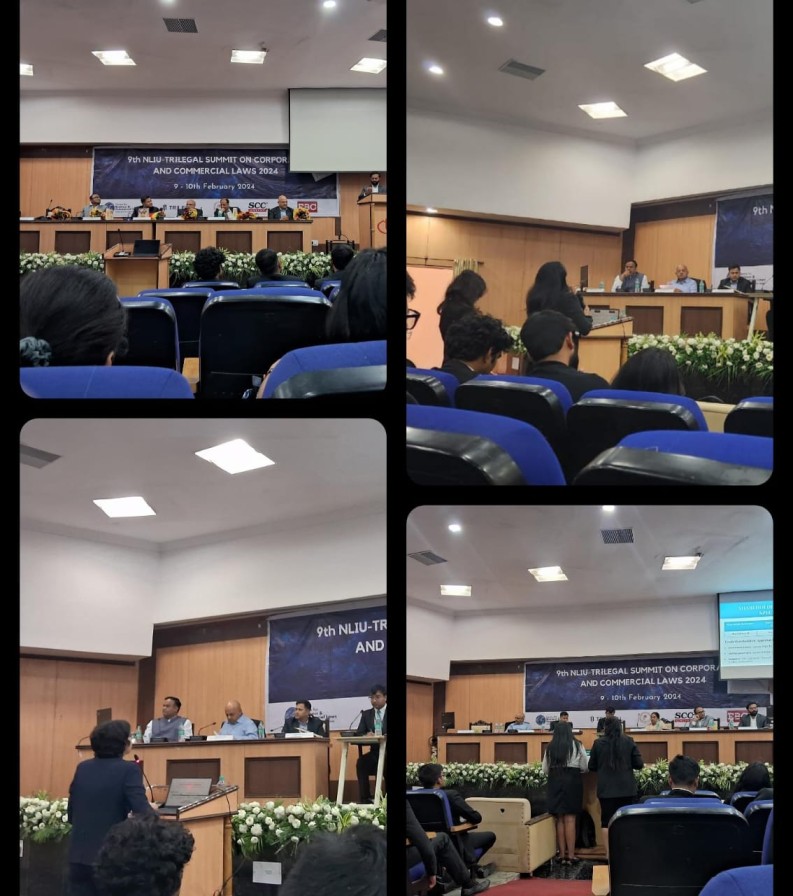
With this we come to the conclusion of the paper presentations and the audience proceeded for High Tea in high anticipation for the Valedictory Ceremony.
5:30 pm, 10th February 2024- Valedictory Ceremony.
The most exciting evening of the event is here and is about to commence, we are already at the valedictory ceremony, awaiting the announcement of the results. The winner of the summit would be provided with an internship and a fully funded foreign trip, whereas the runner-up and the second runner-up would be provided with an internship opportunity with Trilegal.
The dignitaries were invited to share their thoughts and experiences regarding the event. Justice Verma (Chief Guest) , Mr. Mohit Rohatgi (Partner, Trilegal) , Mr. Albin George Thomas (Partner, Trilegal), Mr Siddharth Raja (Guest Lecturer, EBC), Dr. (Prof.) Ghayur Alam ( Chairperson, CBCL), all enlightened the audience and participants with their words of wisdom and encouragement.
Soon after, our convenor Ms. Samavi Srivastava, announced the revealing of the Summit books, which have been published in partnership with EBC.
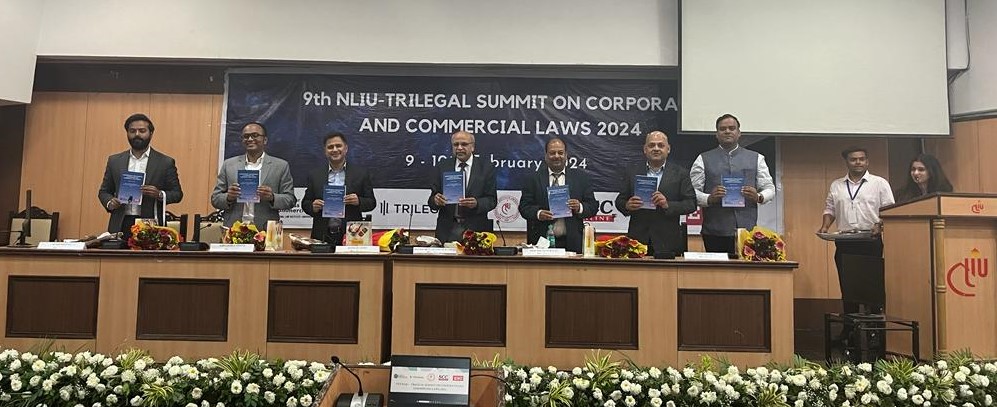
The results have been announced, the same are as follows-
Winner– Krati Gupta and Raj Shekhar (NLU, Jodhpur)
Runner up– Ashita Mathur (NLIU, Bhopal)
Second Runner up– Sunidhi Kashyap (RGNUL, Patiala)

Ms. Samavi Srivastava (Convenor, CBCL), congratulated the winners and thanked everyone involved in making the event a success.


